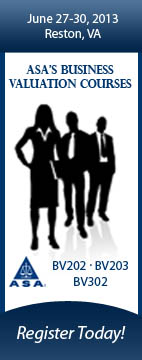
| June 5, 2013 | Issue #129-1 |
Some key takeaways from the NYSSCPA BV conference Excellent speakers and interesting topics highlighted the conference on business valuation put on by the New York State Society of Certified Public Accountants in New York City on May 20. The audience was lively and asked good questions. Responding to one question, Michelle Gallagher (Gallagher & Associates CPAs, PLC) advised that, when collecting information in divorce cases, you should talk to the parties without the attorney present. “People will be more open with you without the attorney in the room,” she says. This is especially true with the out spouse’s attorney, as they especially get tight-lipped, she notes. Another attendee asked whether the “pox on all valuators” attitude by the bankruptcy courts has changed. “There’s a higher and higher bar for valuation experts in the bankruptcy courts,” says Robert F. Reilly (Willamette Management Associates). The judges have a strong “convince me” attitude and are not easily persuaded by valuators. They feel that independent market evidence, such as stock price, is more indicative of value than the testimony of paid valuation experts. Also, judges feel they have a lesser chance of being appealed if they use independent information when it’s available. Other topics at the conference included the market approach using BIZCOMPS, the use of put option models to determine a reasonable DLOM, cheap stock valuations, lost profits, and adjusting restricted stock transactions to estimate marketability discounts. Edward F. Esposito, the conference chair, says the audio of the conference sessions will soon be available on the NYSSCPA website. New bills exempt valuation specialists from ESOP fiduciary statusProposed legislation makes it clear that valuation professionals who appraise employee stock ownership plans (ESOPs) are not fiduciaries under ERISA. A new bill in the House of Representatives (H.R. 2041) joins its companion in the Senate (S. 273) to modify the definition of fiduciary under ERISA to exclude appraisers of ESOPs. These bills come in the wake of a proposed regulation from the Department of Labor mandating that all private ESOP company appraisers be ERISA fiduciaries. "A knowledgeable and experienced valuation professional has an important role to play in assisting ERISA plan decision-makers and related parties,” according to Dr. Susan Mangiero, CFA, certified Financial Risk Manager and an Accredited Investment Fiduciary Analyst. “Whether this regulation passes or not, it is in everyone's best interest to ensure that trained professionals are providing high-quality services. There is a lot of attention being paid to ERISA service provider due diligence these days and this focus is unlikely to go away anytime soon." Mangiero, primary contributor to pensionriskmatters.com, has written an article on valuation with respect to employee benefit plans that will appear in the July 2013 issue of Business Valuation Update. Court: No justification for fractional discounts under intrinsic value review How does a court account for a husband’s fractional interests in companies when the measurement for purposes of equitable distribution is the intrinsic value? This was one of several valuation issues at the center of a recent divorce case. The husband held varying interests in several companies that owned and operated hotels and properties. At divorce, both parties introduced experts (three in all) to determine the value of his investments. The primary focus was on two entities in which the husband had a 33 1/3% and a 40% ownership interest, respectively. The wife’s expert and one of the husband’s two experts used an income approach to value each hotel. But the husband’s second expert performed a fractional interest appraisal of his shares in the companies. To determine the net equity value of each company, he first determined the real estate values of the hotels the companies owned and then added the companies’ other assets and subtracted their liabilities. Next, he multiplied this value by the husband’s ownership percentage to arrive at the pro rataequity value, which he discounted to account for factors related to fractional ownership. These factors might include the ups and downs of the real estate market, the number of owners, income characteristics, lack of control, “sometimes partition ability, finance ability, and the overall marketability,” the expert stated. To arrive at an equitable distribution, the circuit court adopted the values the wife’s expert proposed for the hotels themselves. But it then factored in other assets the companies owned (specifically, cash reserves). Finally, the court subtracted the companies’ debts. Yet even though the court accepted the method the husband’s second expert applied to valuing the pro rata equity value of the companies, it expressly declined to include his proposed discounts, stating that to do so would not be “proper” under the intrinsic value review that state law requires. The husband challenged this—and other findings—in the Virginia Court of Appeals. Courts valuing marital property to make a monetary award must determine the value that represents the asset’s intrinsic worth to the parties, the appellate court stated with emphasis. “The intrinsic value is a very subjective concept.… The methods of valuation must take into consideration the parties themselves and the different situations in which they exist,” it explained. Subject to this standard, the lower court already considered the fact that the husband’s partial interests were not liquid or easily transferable. The court was right not to include the fractional discounts the expert applied within the context of his different analysis, the Court of Appeals decided. Find a comprehensive analysis of Patel v. Patel, 2013 Va. App. LEXIS 110 (April 9, 2013) in the July issue of Business Valuation Update; the opinion will be available soon at BVLaw. Tougher going for valuators as expert witnessesAs we discussed earlier, the bankruptcy court has become less enamored of paid litigation experts on valuation issues, so valuators really need to prepare before sitting on the witness stand. Things have also gotten tougher in other courts as well. Reason: Judges talk to each other—and so do lawyers—about valuation experts who testify in court. Judges call other judges to find out about the expert that will appear before them. And lawyers keep files on all the leading valuation experts. This means they all know when the expert is changing his or her standards of practice. This, of course, can hurt the expert’s credibility.Attend a workshop: Expert witnesses must be able to articulate their positions, be convincing, and deliver an independent opinion that withstands scrutiny under cross-examination. The AICPA Expert Witness Skills Workshop offers attendees a “safe” environment to develop and enhance the skills necessary to be an effective expert witness through practice and critique by industry experts, attorneys, and experienced judges. In advance, you will receive case study materials, including expert reports, which will be the foundation for the workshop’s preparation and training. In three intensive days, you’ll experience a real-life courtroom atmosphere, present to practicing experts and attorneys, and be personally critiqued. You’ll benefit from hands-on training and expert demonstrations, and you’ll even have the opportunity to testify in a mock trial. This blend of classroom lectures and instant personal feedback will provide the key framework for developing the “real” skills you need to flourish as an expert witness. Be sure not to miss this unique opportunity to learn and network with experts and peers. Take your expert witness skills to a new level.This workshop is especially beneficial for CPAs who:
To learn why you should attend the Expert Witness Skills Workshop, watch this video. To register or for more information, click here. Newest CPE eventsIt’s no secret that there has been a rise in the volume of lost profits cases with regard to intellectual property. Lost Profits in Trademark and Copyright Cases, on June 11, marks the fourth installment in BVR’s 2013 Online Symposium on Economic Damages. In this program, experts John Pilkinton (Lone Peak Valuation) and Jed Hansen (Thorpe North and Western) examine classic considerations and emerging trends in assessing damages claims in trademark and copyright cases. On June 13, BVR welcomes experts Michael Nowobiliski and Dwight Davis (both Mid-American Energy and Mining Services Inc.) for Valuing Quarries & Mines. Though mineral extraction is a centuries-old practice, recent economic and regulatory trends have greatly altered the business of mining and quarrying. In this presentation, Nowobiliski will explain what every appraiser needs to know in a quarry or mine engagement.
To ensure this email is delivered to your inbox, please add editor@bvwire.com to your e-mail address book. We respect your online time and privacy and pledge not to abuse this medium. To unsubscribe to BVWire™ reply to this e-mail with 'REMOVE BVWire' in the subject line or use the link below. This email was sent to %%emailaddress%% Copyright © 2013 by Business Valuation Resources, LLC |
Share This!
|



